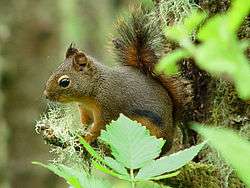vāvere
See also: vāverē
Latvian

Vāvere
Etymology
From a reduplicated form of Proto-Baltic *war-, from Proto-Indo-European *wewer-, from *wor-, *wer- (“squirrel, small forest mammal”), probably from *wer- (“to turn, to bend”) (perhaps because of this animal's flexible body). Cognates include Lithuanian voverė̃, Old Prussian weware, Russian dialectal веверица (veverica), вевёрка (vevjórka), Belarusian вавёрка (vavjórka), Ukrainian віверица (vivéryca), вевірка (vevírka), вивірка (vývirka), Bulgarian веверица (véverica), Czech veverka, Polish wiewiórka, Old High German eihhurno, eihhorno (< *aik-wer-nan, German Eichhorn, Dutch eekhoorn, Persian وروره (varvarah), Latin vīverra (“ferret”).[1]
Noun
vāvere f (5th declension)
Declension
Declension of vāvere (5th declension)
| singular (vienskaitlis) | plural (daudzskaitlis) | |
|---|---|---|
| nominative (nominatīvs) | vāvere | vāveres |
| accusative (akuzatīvs) | vāveri | vāveres |
| genitive (ģenitīvs) | vāveres | vāveru |
| dative (datīvs) | vāverei | vāverēm |
| instrumental (instrumentālis) | vāveri | vāverēm |
| locative (lokatīvs) | vāverē | vāverēs |
| vocative (vokatīvs) | vāvere | vāveres |
Derived terms
References
- Karulis, Konstantīns (1992), “vāvere”, in Latviešu Etimoloģijas Vārdnīca (in Latvian), Rīga: AVOTS, →ISBN
This article is issued from
Wiktionary.
The text is licensed under Creative
Commons - Attribution - Sharealike.
Additional terms may apply for the media files.